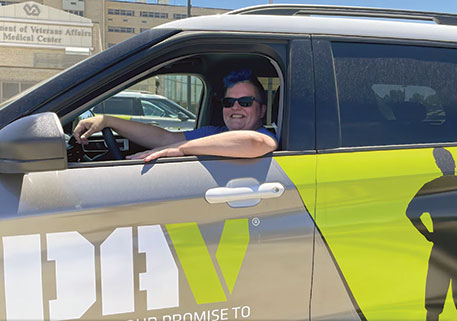
Susan Weller was at her wits’ end when she walked into the Department of Veterans Affairs medical center in Houston looking for help with benefits for her 103-year-old mother, Jane Perlowin Weller. Jane served in the Army Air Corps as a flight nurse during World War II but hadn’t filed for service-connected disability benefits until she was in her 90s.
Jane’s disability benefit compensation, however, was not nearly enough to cover the costs for the round-the-clock care she needed. She was in a semiprivate assisted living situation in Orange County, California, and Susan had been covering the additional costs of her mother’s care.
“I had a distinguished career as a college professor, but my salary was not nearly enough to pay for the rising costs of my mother’s care and I had to take out loans to pay for it,” Susan said. “Loans were just a short-term solution and not financially sustainable for me.”
According to the National Council on Aging, long-term care costs represent the single-largest financial risk for seniors and their families. Studies show that this financial burden on younger generations can create a negative cyclical effect that harms their own future financial stability.
That day at the Houston VA, Susan almost left in tears and with no answers. But before she could leave, a VA worker noticed, listened to her story and gave her contact information for the local DAV service office. That’s when Susan was introduced to DAV benefits advocate Robert Delgado.

Susan told Delgado she had only learned the extent of her mother’s military service later in life. Jane, an aircrew flight nurse with the 830th Medical Air Evacuation Squadron in Hickam Field, Hawaii, flew in C-54 transports, carrying injured patients from the South Pacific Islands. One of about 500 Army flight nurses across 31 medical air evacuations transport squadrons operating worldwide, Jane was among a select group.
The role of a flight nurse during World War II was revolutionary. The lives of the wounded rested on their shoulders—from starting IVs and oxygen to keeping all the ill and injured calm through a combat medical evacuation, Jane did it all. It is a tribute to the nurses’ skill and dedication that of the more than 1.1 million patients air evacuated throughout the war, only 46 died en route.
Now, all Susan could think of was how she was going to have to fight to ensure her mother had the level of care she needs to live out her last days with respect and dignity.
“Susan explained to me how bad it got financially, caring for her aging mother,” Delgado said. “I spoke to her about VA Aid and Attendance and recommended we submit a claim on her mother’s behalf. Unfortunately, the claim was denied on the first submission, but I reassured Susan and told her we could appeal the decision.”
With Jane’s advanced age, a hearing date with the Board of Veterans’ Appeals was expedited and set within a couple of months. At the hearing, a veterans law judge agreed with the case Delgado presented and granted the Wellers VA Aid and Attendance benefits, which have drastically changed their financial situation.
“Susan was such a tenacious advocate for her mother’s long-term care, and I was so happy to hear about the positive decision and the difference that it will make in their lives,” Delgado said.
While VA Aid and Attendance does not pay for all of Jane’s care, the support has been life-changing for the Wellers.
“It has been a rollercoaster ride of emotions these last couple of years,” Susan said. “My mother never wanted to be in a nursing home, and now I have the resources to ensure that this won’t be the case.”
“Navigating veterans benefits can be incredibly difficult, but for family members of veterans, especially those under great stress, the process may almost feel insurmountable,” said DAV National Service Director Jim Marszalek. “Our benefits advocates are there for veterans and their families and can help alleviate some of that burden. We are proud that we were able to provide such significant help to the Weller family.”
For more information
Are you a veteran caregiver or caregiver for a veteran? Learn more about DAV Caregivers Support by visiting davcaregivers.org.





